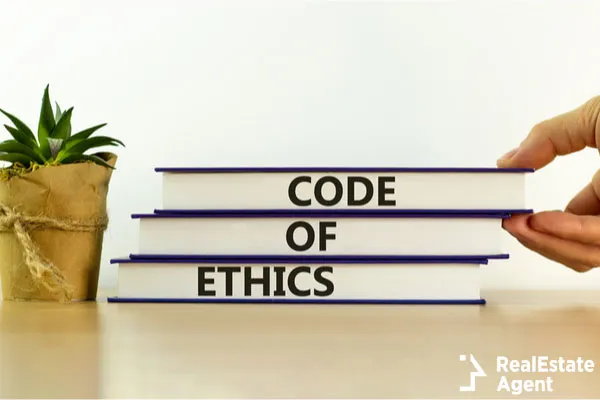
In the real estate business, it’s no secret that flexible morals have had a presence in the field since the very beginning. Whether it’s real estate agents that conceal vital information to make the deal go through or real estate developers cutting corners on multi-million dollar housing projects, this business has a reputation for being less-than-reputable.
While these practices have been present for quite some time, in today’s day and age they are fortunately becoming a lot less common. The advance of technology has done a great deal to bring reckless corruption and blatantly unethical business practices to an end, albeit one that has yet to come.
While it’s certainly more difficult to engage in such business dealings in an age of transparency and universal access to information, there is still a small but notable subsection of the real estate professional community that fail to adhere to the real estate code of ethics. They may be small in number, but these devious few are a veritable dark stain on the profession as a whole.
They’ve got reasons, sure; some do it for the money, others for the sales numbers. Some see an amount of success as a result of their underhanded dealings, but most real estate professionals who violate the real estate code of ethics lose their jobs or even their freedom. In this field, the rules are not meant to be broken.
If you’re starting out in the business of real estate then, you’re going to want to be extra careful not to violate this code of ethics. If you do, you might be rewarded with some small short term gains, but moral failings are almost certain to catch up to you. Whether or not you’re ever legally held accountable for your actions, your reputation will without question suffer for any misdoings. So, what is the real estate code of ethics, and how can you follow it?
Real estate ethics 101
 As a burgeoning real estate professional, you’re going to need to have a firm handle on what is ethical and what isn’t in this business. To this end, we’ve curated this handy list of do’s and don'ts for those seeking to make a name for themselves in the real estate industry. It can be tempting to bend the rules at times, but rest assured that it is never worth the damage to your reputation. Now, let’s have a look at what you should and shouldn’t do as a real estate agent!
As a burgeoning real estate professional, you’re going to need to have a firm handle on what is ethical and what isn’t in this business. To this end, we’ve curated this handy list of do’s and don'ts for those seeking to make a name for themselves in the real estate industry. It can be tempting to bend the rules at times, but rest assured that it is never worth the damage to your reputation. Now, let’s have a look at what you should and shouldn’t do as a real estate agent!
Don’t: conceal relevant information
When you’re selling a home, it can be tempting to do whatever it takes to move the listing. Sometimes this can be a good thing. A real estate agent who does everything legally and morally within their power to sell the home is a real estate agent who is getting the job done well. That’s a good thing!
One thing that won’t fly according to the realtor’s code of ethics, however, is concealing information about the listing. If you fail to disclose issues with the structural, functional or aesthetic functionality of the home, you will face harsh consequences. The code of ethics in real estate is not forgiving when it comes to realtors who intentionally mislead their clients.
This underhanded practice can lead to trouble for you in a multitude of ways. For starters, it will almost certainly mar your reputation. No one wants to work with a realtor or real estate agent who they believe is trying to pull the wool over their eyes! If you gain a reputation as a realtor who will resort to concealing information about the listing to sell it, you will soon have little or no business whatsoever.
Then, of course, there are the legal ramifications of concealing defects or flaws in the home you’re selling. If the buyers wise up to the shortcomings of the house (which they will, sooner or later) they can take you to court for fraud if they have evidence that you didn’t disclose this detail about the home. And, if someone is hurt as the result of a structural defect in the home, you could be held responsible in a court of law!
Do: provide buyers with all financing options

It’s no secret that buying a home in today’s economy is a difficult task. Interest rates are high and median household incomes are low. As a result of these realities, most homebuyers won’t be able to afford a home purchased outright. Instead, they’ll typically opt for a mortgage that they can pay off month-to-month over the course of the next couple years.
A real estate agent’s job to make sure that your clients (both sellers and buyers) get the deal that’s best for them. This means, among other things, researching all available financing options and disclosing them to the buyer. In general this is a simple if somewhat time-consuming process, but you can’t really do anything unethical here, right? Wrong!
As it turns out, there are a number of ways that unscrupulous realtors use financing to garner more sales and higher commissions. Oftentimes realtors will pressure buyers to sign on for a 20-30 year mortgage that seems advantageous at first glance but in reality carries high interest rates, little flexibility and the potential for catastrophic personal loss should the buyers be unable to make their payments.
In general, financing is the same as any other aspect of a realtor’s job. Be honest with your clients, and do your best to serve their best interests over your own. It may not be profitable immediately, but it will pay off in the long run. A good reputation is worth more than any commission in the world, and you won’t get such a reputation by hiding important details!
Don’t: pressure buyers into making a purchase

Another thing that is sure to mar your still-developing reputation is pressure sales. If you’ve ever bought property or talked to someone who has, there’s a good chance you know what this looks like. A realtor or real estate agent is trying to sell a house; they find a buyer who doesn’t have the money to buy, but they pressure them until they cave in and sign on for a mortgage that they will be paying back for decades to come.
While this might not strictly speaking be illegal, it is far and away one of the most unethical things that a real estate agent or realtor can do. Pressuring an economically challenged individual or family into purchasing a home that they neither want nor can afford will likely place them in an extremely disadvantageous position for an extended period of time, or possibly forever. Do. Not. Do. It.
The real estate code of ethics isn’t the only thing that forbids this type of sales strategy; it’s also forbidden by law in many states. If the buyer can prove that they bought the house as a result of underhanded pressure tactics, a judge may rule that their mortgage contract was made in bad faith. If this happens, you could receive a fine or a prison sentence.
Once again, there’s very little to be gained by pressuring buyers into hasty and regrettable sales. If you believe that the home that you’re showing is not compatible with the buyer you’re showing it to, then just show them a different home. In ten years you won’t remember one missed sale; you will remember a ruined reputation!
Do: treat your fellow real estate agents with respect

There’s no shame in admitting it: real estate is competitive. Sooner or later, you’re going to reach a point where a sale will either go to you or to another real estate agent. Doing what it takes to make the sale is fine, as long as you stay within the bounds of respectability. Flowers, chocolate, reduced commission, whatever; just keep it professional!
When things begin to become problematic, however, is when you start feeling like you’ve got to play dirty. Maybe your fellow realtor sunk to the level of slandering your reputation or used some other below-the-belt tactics. When something like this happens, it’s probably time to just walk away. There’s nothing to be won in such a competition.
Sometimes your competitors won’t have to sink to unfair tactics to make the sale. Sometimes, they’ll win because they’re more experienced, or better suited to make the sale. It might be tempting to sink to underhanded tactics, but this won’t gain you anything in the long run. Shake your opponent’s hand, congratulate them on their success, and admit defeat.
Failing to act respectfully simply won’t do. If you gain a reputation as a sore loser or an unfair competitor, you’ll quickly lose the respect of your colleagues. The real estate code of ethics dictates that you should endeavor to aid or collaborate with your real estate colleagues whenever possible. That’s just what the job is about; helping people, whether they’re clients or fellow real estate professionals!
Conclusion
Ethics in business can be a difficult topic to broach in the field of real estate. Everyone wants to be treated ethically, but refusing to bend the rules when it seems to be in your best interests can be difficult indeed. There’s no shame in admitting these imperfections; everyone has them. What’s important is that you don’t cave to the impulse!
The best way to hone your moral compass when it comes to the code of ethics in real estate is to find a real estate agent with more experience than you and ask for their advice. With their guidance, you’ll know how to approach any situation you might face on a moral level. And, if you ever encounter one where you’re not sure what to do, you can just call them up and ask!


















Is it ethical for one realtor to tell a listing agent that they have a showing only because they want to owe the property privately for their own interest? Meaning they are interested in buying the property.
Jul 30, 2022 10:38:41